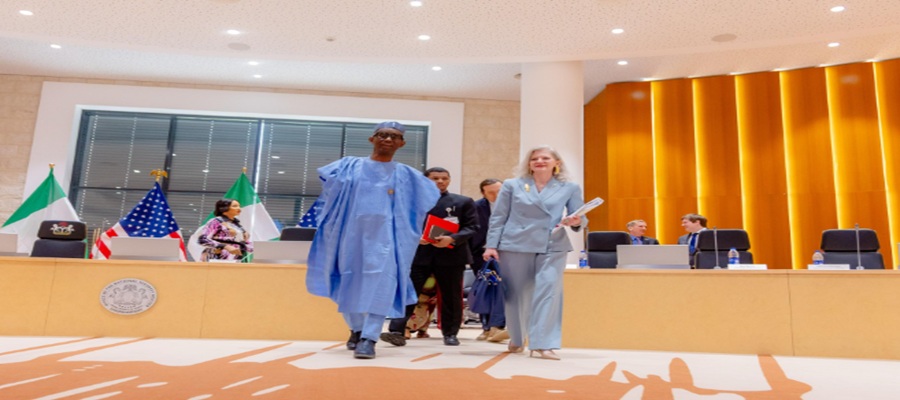General News
Experts Deplore Mixture of Govt Communications with Nation Branding

Miss Wendy Tlou, chief marketing officer, Brand South Africa, has said one of the keys to a successful nation branding initiative is to separate it from the government communication programme.
Speaking as the guest speaker at this year’s Public Relations Consultants Association of Nigeria (PRCAN) Annual Public Relations Gold Medal Lecture themed: “Destination Marketing: A Case Study of The South Africa Experience” in Lagos, Tlou said the inability to separate the two distinct functions could hamper the progress of a nation brand building project.
Drawing from South Africa’s experience in building “Brand South Africa”, a project whose marketing and communication programme she has been privileged to drive, Tlou noted that while the government’s activities and achievements could go a long way in supporting nation brand building, having the managers of that process to also act as mouth pieces of the government could be counter-productive.
She said: “The secret of successful destination marketing lies in separating national communication from government communication. The mistake we all make is to assume that government is the only source of information about the country. Government is a great source of information in terms of how it is running the country; it is not however the only source.
“The role of government is to communicate the steps and programmes, what service delivery it is putting in place to ensure that the lives of the citizens are improved every single day, while the role of the nation brand builders is to position the country to the world as a destination for tourism and investment, irrespective of what administration is in power at any particular point in time”.
According to Tlou, although ‘Brand South Africa’ is the brain child of former President Thabo Mbeki and also reports directly to the Presidency, it operates independently as a private enterprise.
Speaking further, she argued that building a successful nation brand is not about a geographical location but about the people in that location.
According to her, the government must obtain the buy-in of the citizens, who then naturally become the project’s ambassadors.
“At the heart of nation brand building must be the people of the nation. If the people are not convinced to buy into the dreams that the country is selling to the world, the whole effort will be nothing but a waste of resources.”
Tlou recalled that one mistake Brand South Africa made at the outset of its work was to ignore South Africans themselves – the citizens, business organisations, civil organizations and the media – and to run off, trying to sell their country to the international community.
Earlier in his opening remarks, Mr. John Ehiguese, CEO, Mediacraft Associates and president, PRCAN disclosed that the choice of the theme was informed by repeated past failures of Nigeria at nation brand building. He noted that there were lessons to learn from South Africa that has successfully turned itself into a tourism and investment destination of choice in Africa.
He said: “The choice of this year’s theme was informed by the simple fact that over the years our country Nigeria has made several efforts at destination marketing, but it does appear those efforts have not been particularly successful. On the other hand, South Africans who came out of the harrowing experience of apartheid have successfully turned their country into a destination for tourism and investment. So we said to ourselves that perhaps there are some lessons we can take home from them. Hence the choice of Wendy Tlou, who happens to have been deeply involved in the whole process in South Africa.”
The Annual Public Relations Gold Medal Lecture is a thought leadership initiative of PRCAN to stimulate public discourse on national issues that have direct bearing on Nigeria’s economic, political and social well-being.
This year’s is the second in the series. The first edition, held in October 2013, featured ex-Governor of Ekiti State, Dr. Kayode Fayemi, who spoke on the topic: “The imperatives of Policy Communication in Deepening Democracy and Governance”.
General News
Nigeria Treats Religious Violence as Attack on State – NSA Ribadu

National Security Adviser Nuhu Ribadu has said the federal government considers religious violence an attack on the Nigerian state, stressing that the protection of all citizens, regardless of faith, is non-negotiable.

According to presidential spokesperson Bayo Onanuga, Ribadu made the remarks in Abuja at the close of a US–Nigeria Joint Working Group session.
“Nigeria is a deeply plural society, and the protection of all citizens, Christians, Muslims, and those of other beliefs, is non-negotiable,” Ribadu said.
“Violence framed along religious lines is treated as an attack on the Nigerian state itself.”
In a follow-up post on X, Ribadu said the joint working group has recorded “tangible operational gains” in the fight against terrorism.
The working group was set up following Nigeria’s designation as a Country of Particular Concern (CPC) by US President Donald Trump, a label that often triggers policy actions aimed at ending severe violations of religious freedom.
At the meeting, Ribadu led Nigeria’s delegation, which included representatives from 10 ministries and agencies, while the US delegation, made up of eight federal agencies, was led by Allison Hooker, US under-secretary of state.
Ribadu said Nigeria-US security cooperation has moved from dialogue to action, resulting in the disruption of terrorist networks and transnational criminal groups. He also praised the US for supplying drones, helicopters, platforms, spare parts, and other support systems over the past five years.
Speaking at the session, Hooker said the US was committed to expanding its partnership with Nigeria, particularly on deterring violence against Christian communities.
“Today, we are here to discuss how we can work together to deter violence against Christian communities, prioritising counter-terrorism, insecurity, investigation of attacks, and holding perpetrators accountable,” she said.
She added that efforts would focus on reducing killings, forced displacement, and abductions of Christians, especially in Nigeria’s north-central states
General News
PalmPay User Shares Experience on Fintech Apps to Trust in Nigeria

For many Nigerians, fintech apps are judged by one simple question: Can I trust the platform? For Happiness, a young Nigerian entrepreneur, the answer manifested in the most defining moments of her life.

Trust Built Through Everyday Use
In 2025, Happiness relied on PalmPay to run her business, from receiving customer payments, paying vendors, and managing daily transactions. During PalmPay’s Hustle Grant Campaign, she joined thousands of small business owners hoping to win the N500,000 funding.
While she didn’t make the shortlist, the campaign gave her business something just as valuable: visibility. New customers discovered her brand, enquiries increased, and sales followed.
PalmPay didn’t just host a campaign; it created an ecosystem where small businesses could be seen and supported.
Just days later, Happiness’ life changed. On August 30, 2025, she lost her father. With this loss came challenges, especially payments. They tried transferring money through regular banks but were met with declined transactions. Happiness suggested using her PalmPay account and it was successful.
In a moment defined by loss and urgency, PalmPay cut through the chaos, proving that reliability isn’t a feature, it’s a lifeline. Happiness’ relationship with PalmPay didn’t stop at transactions. Through other management tools on the app, she learned to build discipline around her finances.
More Than an App, a Financial Partner
Beyond transactions, PalmPay’s tools helped Happiness build better money habits and financial discipline. Today, the brand continues to reward reliability through initiatives like its ongoing Premier Cool campaign, reinforcing a simple message: consistency should come with value.
The idea is simple: Purchase a bar of soap and stand a chance to get ₦10,000cash and other cash benefits.
It’s PalmPay’s way of saying that smart money habits deserve real value in return.
Why PalmPay Earns Trust
Life doesn’t give warnings before it tests you. When it does, you need a platform that doesn’t just usually work but always works.
For many users, PalmPay proves to be more than a payment app. It is a trusted partner powering ambitions, supporting users through defining life moments, while helping them bank smartly.
When it mattered most, PalmPay worked. To watch the full testimonial visit: @palmpayapp_ng
General News
Nigerians Target Self-Improvement, Business Startups in 2026 Google Data

Google Search data from the first two weeks of 2026 reveals Nigerians are prioritising ambition, self-growth, and entrepreneurial ventures as they embrace the new year with renewed drive for personal and professional excellence.

The data shows a 40 per cent spike in searches related to self-improvement and “becoming better”, reflecting a nationwide shift from mere resolutions to actionable plans across boardrooms, classrooms, and homes. Entrepreneurship leads the charge, with “how to start a business” topping “how to start” queries after an 80 per cent surge, alongside rising interest in blogging, podcasting, and YouTube channels to foster economic opportunities.
Personal development dominates, as searches for “how to be a better person” rose 20 per cent, extending to relationships with queries on becoming better lovers, partners, husbands, wives, and listeners. Health resolutions gain traction, with 40 per cent increases in “how to eat healthy”, “healthy diet”, and “how to meditate” underscoring commitments to physical vitality and mental wellness.
Skill mastery captivates diverse audiences, from “how to improve English” and communication skills to enhancing memory, credit scores, and even handwriting, while leisure pursuits spike in “how to get better at” chess, singing, running, Fortnite, and soccer. Top searches include “how to improve communication skills”, “how to be a better listener”, and entrepreneurial starters like “how to start a podcast”, painting a portrait of a nation honing edges for success.
Taiwo Kola-Ogunlade, Communications and Public Affairs Manager for West Africa at Google, described the trends as a “powerful reflection of Nigeria’s collective ambition”, affirming the company’s dedication to tools like Search and Gemini for guiding Nigerians toward prosperity

 E-Financial3 days ago
E-Financial3 days agoZenith Bank Gets Regulatory Approval for Full Takeover of Paramount Bank

 Telecom3 days ago
Telecom3 days agoNew Investment Fund Targets Acceleration of Emerging Technology in Nigeria

 E-Business3 days ago
E-Business3 days agoFirm Detected a Fivefold Surge in QR Code Phishing Attacks in the Second Half of 2025

 General News2 days ago
General News2 days agoPalmPay User Shares Experience on Fintech Apps to Trust in Nigeria

 News2 days ago
News2 days agoStakeholders Demand Stronger Governance and Infrastructure to Drive Tech Adoption @ Lagos AI Summit

 General News2 days ago
General News2 days agoNigerians Target Self-Improvement, Business Startups in 2026 Google Data

 News2 days ago
News2 days ago35 Million Nigerians Face Acute Hunger in 2026, UN Warns

 General News2 days ago
General News2 days agoHow Inside Jobs and Policy Shocks Trigger Nigeria’s Rising Loan Crisis

























